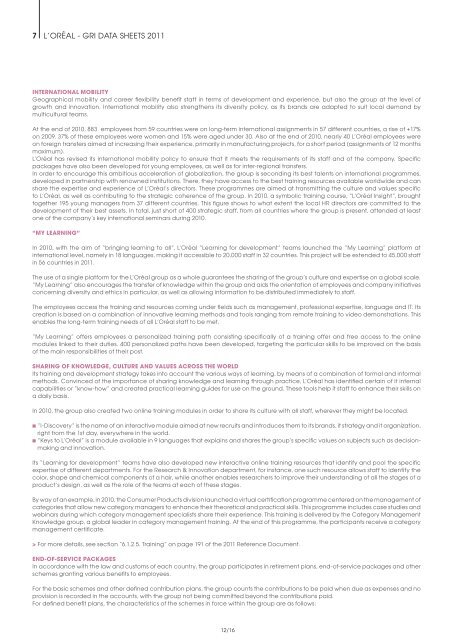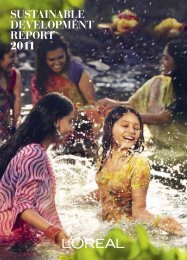Organizational Strategy - Sustainable Development - L'Oréal
Organizational Strategy - Sustainable Development - L'Oréal
Organizational Strategy - Sustainable Development - L'Oréal
You also want an ePaper? Increase the reach of your titles
YUMPU automatically turns print PDFs into web optimized ePapers that Google loves.
7 L’OréaL - GrI DaTa SHEETS 2011<br />
INTERNATIONAL MOBILITY<br />
Geographical mobility and career flexibility benefit staff in terms of development and experience, but also the group at the level of<br />
growth and innovation. International mobility also strengthens its diversity policy, as its brands are adapted to suit local demand by<br />
multicultural teams.<br />
at the end of 2010, 883 employees from 59 countries were on long-term international assignments in 57 different countries, a rise of +17%<br />
on 2009. 37% of these employees were women and 15% were aged under 30. also at the end of 2010, nearly 40 L’Oréal employees were<br />
on foreign transfers aimed at increasing their experience, primarily in manufacturing projects, for a short period (assignments of 12 months<br />
maximum).<br />
L’Oréal has revised its international mobility policy to ensure that it meets the requirements of its staff and of the company. Specific<br />
packages have also been developed for young employees, as well as for inter-regional transfers.<br />
In order to encourage this ambitious acceleration of globalization, the group is seconding its best talents on international programmes,<br />
developed in partnership with renowned institutions. There, they have access to the best training resources available worldwide and can<br />
share the expertise and experience of L’Oréal’s directors. These programmes are aimed at transmitting the culture and values specific<br />
to L’Oréal, as well as contributing to the strategic coherence of the group. In 2010, a symbolic training course, “L’Oréal Insight”, brought<br />
together 195 young managers from 37 different countries. This figure shows to what extent the local Hr directors are committed to the<br />
development of their best assets. In total, just short of 400 strategic staff, from all countries where the group is present, attended at least<br />
one of the company’s key international seminars during 2010.<br />
“MY LEARNING”<br />
In 2010, with the aim of “bringing learning to all”, L’Oréal “Learning for development” teams launched the “My Learning” platform at<br />
international level, namely in 18 languages, making it accessible to 20,000 staff in 32 countries. This project will be extended to 45,000 staff<br />
in 56 countries in 2011.<br />
The use of a single platform for the L’Oréal group as a whole guarantees the sharing of the group’s culture and expertise on a global scale.<br />
“My Learning” also encourages the transfer of knowledge within the group and aids the orientation of employees and company initiatives<br />
concerning diversity and ethics in particular, as well as allowing information to be distributed immediately to staff.<br />
The employees access the training and resources coming under fields such as management, professional expertise, language and IT. Its<br />
creation is based on a combination of innovative learning methods and tools ranging from remote training to video demonstrations. This<br />
enables the long-term training needs of all L’Oréal staff to be met.<br />
“My Learning” offers employees a personalized training path consisting specifically of a training offer and free access to the online<br />
modules linked to their duties. 400 personalized paths have been developed, targeting the particular skills to be improved on the basis<br />
of the main responsibilities of their post.<br />
SHARING OF KNOWLEDGE, CULTURE AND VALUES ACROSS THE WORLD<br />
Its training and development strategy takes into account the various ways of learning, by means of a combination of formal and informal<br />
methods. Convinced of the importance of sharing knowledge and learning through practice, L’Oréal has identified certain of it internal<br />
capabilities or “know-how” and created practical learning guides for use on the ground. These tools help it staff to enhance their skills on<br />
a daily basis.<br />
In 2010, the group also created two online training modules in order to share its culture with all staff, wherever they might be located.<br />
n “I-Discovery” is the name of an interactive module aimed at new recruits and introduces them to its brands, it strategy and it organization,<br />
right from the 1st day, everywhere in the world.<br />
n “Keys to L’Oréal” is a module available in 9 languages that explains and shares the group’s specific values on subjects such as decisionmaking<br />
and innovation.<br />
Its “Learning for development” teams have also developed new interactive online training resources that identify and pool the specific<br />
expertise of different departments. For the research & Innovation department, for instance, one such resource allows staff to identify the<br />
color, shape and chemical components of a hair, while another enables researchers to improve their understanding of all the stages of a<br />
product’s design, as well as the role of the teams at each of these stages.<br />
By way of an example, in 2010, the Consumer Products division launched a virtual certification programme centered on the management of<br />
categories that allow new category managers to enhance their theoretical and practical skills. This programme includes case studies and<br />
webinars during which category management specialists share their experience. This training is delivered by the Category Management<br />
Knowledge group, a global leader in category management training. at the end of this programme, the participants receive a category<br />
management certificate.<br />
> For more details, see section “6.1.2.5. Training” on page 191 of the 2011 reference Document.<br />
END-OF-SERVICE PACKAGES<br />
In accordance with the law and customs of each country, the group participates in retirement plans, end-of-service packages and other<br />
schemes granting various benefits to employees.<br />
For the basic schemes and other defined contribution plans, the group counts the contributions to be paid when due as expenses and no<br />
provision is recorded in the accounts, with the group not being committed beyond the contributions paid.<br />
For defined benefit plans, the characteristics of the schemes in force within the group are as follows:<br />
12/16






